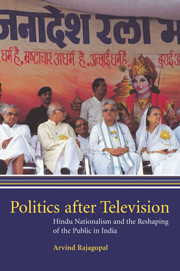Book contents
- Frontmatter
- Contents
- Acknowledgments
- Introduction
- 1 Hindu nationalism and the cultural forms of Indian politics
- 2 Prime time religion
- 3 The communicating thing and its public
- 4 A “split public” in the making and unmaking of the Ram Janmabhumi movement
- 5 Organization, performance, and symbol
- 6 Hindutva goes global
- Conclusion
- Appendix: Background to the Babri Masjid dispute
- Notes
- Select bibliography
- Index
Introduction
Published online by Cambridge University Press: 22 September 2009
- Frontmatter
- Contents
- Acknowledgments
- Introduction
- 1 Hindu nationalism and the cultural forms of Indian politics
- 2 Prime time religion
- 3 The communicating thing and its public
- 4 A “split public” in the making and unmaking of the Ram Janmabhumi movement
- 5 Organization, performance, and symbol
- 6 Hindutva goes global
- Conclusion
- Appendix: Background to the Babri Masjid dispute
- Notes
- Select bibliography
- Index
Summary
This book is about the work and influence of the media on the career of Hindu nationalist mobilization in India during the late 1980s and early 1990s. It examines the unfolding of the Ram Janmabhumi, or Birthplace of Ram movement, which brought the Bharatiya Janata Party (BJP, or Indian People's Party) into political prominence. It discusses, among other things, the pre-publicity given to the movement's chief symbols via a national broadcast of the Ramayan, a serialized Hindu epic; the promotion carried out by Hindu nationalists through publicity images and through fashioning political participation on consumer choice rather than ideological commitment per se; the attention given the movement by a language-divided print media; television viewers' own readings of the Ramayan serial; and the structured misperceptions of non-resident supporters in the U.S. In arguing that Hindu nationalism's recent salience depended on and worked itself out through the media, I neither uncover nor confirm any simple causal mechanisms of media effect. Instead, I argue that the media re-shape the context in which politics is conceived, enacted, and understood. Hindu nationalism represented an attempt to fashion a Hindu public within the nexus of market reforms and the expansion of communications, rather than religious reaction as such. Focusing on the moment of its emergence clarifies the historical conditions for the transition to a new visual regime, as it were, and at the same time shows the extent to which this emergence cannot be explained with reference to purely material circumstances.
- Type
- Chapter
- Information
- Politics after TelevisionHindu Nationalism and the Reshaping of the Public in India, pp. 1 - 29Publisher: Cambridge University PressPrint publication year: 2001
- 1
- Cited by



